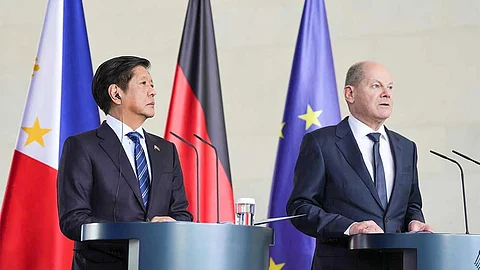

GERMAN Chancellor Olaf Scholz urged Filipinos to join the German labor market, noting the passage of a legislation in the European country for easier entry of foreign workers.
In a joint press conference with President Ferdinand Marcos Jr., Scholz highlighted Germany’s immigration law reforms that aim to attract skilled foreign workers and combat labor shortages in the country.
“The legislation that we’ve just passed lays the foundation and makes it a lot easier for people to have access to the German labor market,” he said.
“I believe it to be the probably the most advanced and modern legislation in that regard. We know that our prosperity and growth depend on professional workers from outside and we want to create favorable conditions here,” he added.
Scholz and Marcos signed on Tuesday, March 12, 2024, the renewal of “Cooperation Program” between the Technical Education and Skills Development Authority (Tesda) and the Federal Institute for Vocational Education and Training for the upskilling and reskilling of Filipino workers.
Among the capacity building measures are conducting thematic visits per year, with both entities providing workplace and technical facilities free of charge.
Other measures include exchange on policy research and knowledge management, support evaluation for apprenticeship and dual training systems programs, and support evaluation and improvement of the Study on the Employment of Technical and Vocational Education and Training (TVET) Graduates (SETG).
Aside from capacity building, there will be exchanges under Philippine Regional Innovation Centres (RIC) and German Center of Vocational Excellence (CoVE) with the aim of demonstrating how digital learning are embedded in the newly founded 17 RIC and CoVE.
Marcos recognized the importance of collaboration with Germany in skills vocational training as the Philippines gears to transform its economy.
“The transformation can only occur when our workforce is, I think the buzz words everybody uses now is upskill and re-skill,” he said.
“And we look to Germany for much of that training, especially since we are very much immersed now in the digital space and the high-technology requirements for the workforce — the training for high-technology jobs in the workforce — is something that will be necessary to keep our economy thriving,” he added.
Marcos said it will be advantageous to the Philippines because its workforce will be better trained, and it will be an advantage to Germany because of the workforce that can contribute to the German economy as well.
Marcos and Scholz also discussed ways on how to enhance the trade and investment cooperation of the Philippines and Germany.
Germany was Philippines’ 11th trading partner in 2023 and has been a major source of foreign direct investment, contributing a substantial $7 billion, or P393.55 billion in the first nine months of 2023.
Marcos welcomed the presence of German businesses in the country such as Siemens, Lufthansa, Deutsche Bank, Bayer and Bosch, among others.
The chief executive maintained that the Philippines is now a more attractive option for investment highlighting its strong economic outlook with a GDP growth rate of 5.6 percent in 2023, outpacing economies in Asia driven by strong domestic consumption, supported by a diverse labor market, growing services industry and remittances. (TPM/SunStar Philippines)